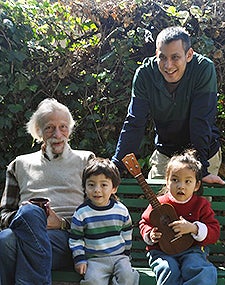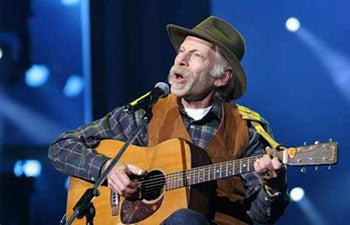In Memoriam: Eugene Cooper, 68
Eugene (Gene) Cooper, professor of anthropology, has died. He was 68.
Cooper died at Huntington Memorial Hospital in Pasadena, Calif., on Oct. 18 from pneumonia and septic shock. His death came just days after announcing his diagnosis of multiple myeloma to colleagues. He had, however, been optimistic about treatment and determined to continue teaching.
Born on May 18, 1947, to a Jewish socialist family in New York City, Cooper was the son of a New York Department of Labor employee and a high school secretary. He grew up in Brooklyn, N.Y., and was the first member of his family to graduate from college, receiving his bachelor’s degree in anthropology from State University of New York at Buffalo in 1968. He earned his masters and his Ph.D. in anthropology and East Asian studies at Columbia University in 1976.
He taught at the University of Pittsburgh and Hong Kong University before joining USC Dornsife in 1980. In a career at USC Dornsife that spanned 35 years, “Coops,” as he was affectionately known, won the respect and affection of generations of students to whom he generously devoted his time, his vast knowledge and unrelenting honesty.
A sinologist who specialized in Chinese folk custom, Cooper was also an expert on Chinese civilization, the overseas Chinese diaspora, economic anthropology/political economy, marriage, family and kinship, peasant society, popular culture, and American folklore. He consulted with businesses, industry leaders and legal professionals on Chinese rural industrial production, the import/export sector and Chinese habit and custom.
A fluent Mandarin and Cantonese speaker, Cooper was one of the first foreigners to enter China after the Cultural Revolution and had met the wife of Chinese Communist revolutionary and People’s Republic of China founding father Mao Zedong.
A revolutionary spirit
Gary Seaman, associate professor and chair of anthropology, described Cooper as the lodestone of USC Dornsife’s department of anthropology for 35 years.
“Not to tell north from south (although since he was from Brooklyn, it was possible to infer differences in those regional cultures from his opinions, as well), but left from right,” Seaman said. “As the poster tacked up outside his office door with the triumvirate of Sozialistischer Deutscher Studentenbund founding fathers proclaims: ‘Everyone talks about the weather: NOT US.’ Cooper never talked about the weather. He was a serious man and a serious thinker. Our deliberations in the department will be less profound without him.”

Gene Cooper with his sons Gabriel (center) and Raphael (standing) and his granddaughter Jazmine (right). Photo courtesy of Jennifer Cool.
Cooper’s long, bushy handlebar mustache and corduroy jacket with elbow patches were a familiar sight at events on USC’s University Park campus.
Alumna Jennifer Cool, lecturer in the department of anthropology, knew Cooper for 25 years, first as a member of her dissertation committee and then as her mentor when she joined the anthropology department in 2010. She described her teacher, mentor, colleague and friend as “smart-as-a-whip, Brooklyn-bred, a revolutionary spirit.
“‘Coops looked like you’d expect an anthropology professor to look,’ one of my students remarked as she shared the news of his death with a classmate,” Cool said. “Yes, he looked the part. But it was more than a look. He embodied all a professor should be — brilliant, tough, caring, passionate — and funny as hell. He was always game for a stimulating conversation, as quick to defend an ideal as to champion a colleague.”
An exceptional teacher and mentor
Nancy Lutkehaus, professor of anthropology and political science, said Cooper was a dedicated and renowned scholar of the anthropology of China.
“To his colleagues and friends he was also an irreverent, irascible character, in the best sense of the term,” she added. “Although Gene never hesitated to speak his mind, he was also one of the most principled, caring individuals I knew. An exceptional teacher and mentor — as the many comments coming in on Facebook demonstrate — Gene’s teaching and dedication to the discipline of anthropology touched the lives of people worldwide.”
Among them is alumna Teresa Kuan, now an assistant professor of anthropology at The Chinese University of Hong Kong (CUHK). Kuan earned her Ph.D. in anthropology from USC Dornsife in 2010. Cooper, who was due to visit Hong Kong as a visiting scholar at the Institute of Chinese Studies at CUHK in the spring, was a member of Kuan’s doctoral committee.
“Our beloved Coops was taken away from us much too soon, but his spirit truly will live on, for a great scholar-teacher does more than inspire,” Kuan wrote. “I am immensely lucky to have studied under his tutelage.”
Among Cooper’s more recent research topics were the market temple fairs of Jinhua municipality in Zhejiang province in China, which he researched during the 2006-07 academic year spent at the Institute of Advanced Study at Princeton University in New Jersey. The resulting book was The Market and Temple Fairs of Rural China: Red Fire (Routledge, 2012).
An earlier book, Adventures in Chinese Bureaucracy (Nova Science Pub Inc., 2000), chronicled his personal tales of woe and intrigue as he endured five years of false starts, detours, dead ends and disappointments while seeking approval from Chinese authorities to mount an ethnographic research project in rural China.
Brett Sheehan, professor of history and director of the East Asian Studies Center, described Cooper as a longtime active supporter of the center’s work.
“He was a dynamic presence at many of our conferences and workshops, and he was a mainstay of our master’s program, where he often taught the graduate seminar for M.A. students and generously served on many M.A. committees,” Sheehan said. “He will be missed by his colleagues and students.”
An unusual talent
Cooper’s elder son, Raphael Cooper, who graduated from USC Dornsife with a bachelor’s degree in visual anthropology and a minor in East Asian languages and studies in 2001, described his father as “a man of music, knowledge and humor.”
Indeed, as an accomplished musician and lover of bluegrass, Cooper had an unusual talent: singing Chinese folk songs in fluent Mandarin. In 2005, he was flown to Beijing as a finalist in the hit series, Arts of Our Land, a week-long televised talent show featuring non-Chinese people performing Chinese arts.
He had wowed the show’s producers months earlier at his audition in Los Angeles, singing a famous Cultural Revolution song, bluegrass-style, in perfect Chinese. At the final — a live broadcast on Lunar New Year — he sang a country and western rendition of “Lift Up Your Veil,” a Chinese folk song about a husband’s first encounter with his bride, accompanying himself on guitar, to a television audience of more than 100 million. He took second place.

Gene Cooper performing on Arts of Our Land, a televised talent show featuring non-Chinese people performing Chinese arts, in 2005. He took second place and his performance was broadcast live to more than 100 million people. Photo courtesy of Jennifer Cool.
In spring 2012, Cooper gave the inaugural lecture at the newly established Institute of Anthropology at East China Normal University in Shanghai on the subject “Chinese Minstrelsy: The Folk Performance Art of Jinhua Daoqing.”
“My dad spoke with a penetrating voice and a rhythmic cadence that would turn his stories and lessons into a multidimensional experience that only he could give. Always to the point, always eloquent,” Raphael Cooper said. “This was his gift, which he shared generously with his family, friends, colleagues and students, proliferating love, knowledge and laughs, wrapped nicely in a Brooklyn accent.”
A former colleague, Soo-Young Chin, served as an assistant professor of anthropology and American studies at USC Dornsife from 1994-2000, when she had the office next door to Cooper’s.
“What a wonderful six years it was,” she wrote. “Coop was an original one-of-a-kind scholar, colleague and friend. Beneath all the boisterous fun and tomfoolery (and we had a lot of that), Eugene Cooper was a kind and gentle soul who tried to protect and guide those around him — students, friends and colleagues. A very special soul has departed.”
A diligent and stimulating advisor, Cooper read and responded to students’ work with interest, insight, speed and wit. He received the USC Mellon Award for Mentoring in 2008-09.
“He spoke his mind and challenged others to do the same,” Cool said. “Under the Brooklyn-tough exterior, he was always a mensch, a champion for social justice, whether on the scale of the world system or of nominating colleagues for recognition.”
Professor of Anthropology Andrei Simic was in Serbia when he heard of Cooper’s death.
“The word that immediately comes to mind when thinking about Gene is ‘authentic,’ and he was in truth spontaneous, unselfconscious and authentic in a way that very few people are,” he said. “He was always true to his beliefs and values, which he expressed with courage and passion, even in the face of opposition and disapproval. Yet, at heart, he was a sincerely empathetic and kind human being whom I will miss more than I can adequately explain here. When I return to the department in January, I will do so with a heavy heart and will surely be conscious of the emotional and intellectual vacuum that has been left by Gene’s death.”
Rudy Melson of anthropology worked with Cooper for the past three months. “Gene treasured his students and was, in return, treasured by them,” he said. “He was, and remains, a larger than life spirit.”
Lanita Jacobs, associate professor of anthropology and American studies and ethnicity, agreed. “Coops is a memorable soul,” she said. “His smile was deep, wide and contagious.”
Cooper is survived by his sons, Raphael Cooper and Gabriel Cooper, his younger brother, Robert Cooper, and his wife, Xiao Zhen Zhang.
A private family cremation will be held on Monday, Oct. 26. A memorial service is being planned for a later date.